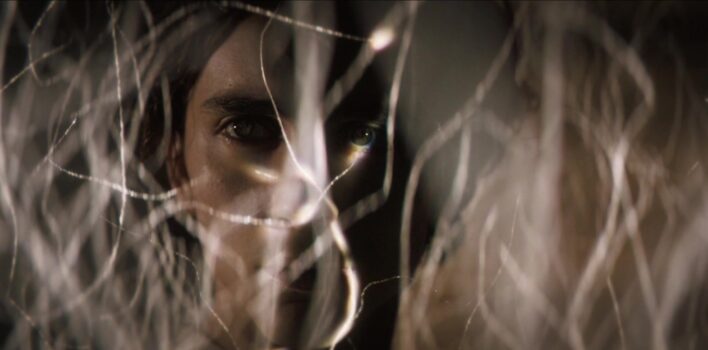Kwisatz Haderach: The Promised Savior in Dune Part 1 (2021)
 I had no experience with Dune before I watched Denis Villeneuve’s 2021 film adaptation, and that lack of grand expectations is probably why I was so happily surprised by how fresh, epic, beautiful, and well made it was. In an ocean of endless sci-fi and fantasy content, it seems rare these days to have a genuinely good experience with a piece of entertainment that’s not desperately trying to capitalize on nostalgia or cheap references to beloved web-slingers.
I had no experience with Dune before I watched Denis Villeneuve’s 2021 film adaptation, and that lack of grand expectations is probably why I was so happily surprised by how fresh, epic, beautiful, and well made it was. In an ocean of endless sci-fi and fantasy content, it seems rare these days to have a genuinely good experience with a piece of entertainment that’s not desperately trying to capitalize on nostalgia or cheap references to beloved web-slingers.
It’s easy to churn out tv shows and even movies that cater to nostalgia and brand recognition as an effective means to sell tickets and keep subscribers, but artistically and creatively it’s often unfulfilling for both the creator and audience. Give me another ten fresh takes on sci-fi—like Villeneueve did with Dune—and let Marvel rest.
In any case, I’m excited about the new Dune series of films and I hope to see more projects like this flourish. Back in 2021, I marveled at how a director could take a universe as dense and complex as Dune’s and make a coherent movie that could inform, entertain, and make money all at once. Villeneuve did it spectacularly (with the help of a heavy hitting cast, Hans Zimmer’s score, cinematographer Greig Fraser’s camera work, and many others). The film was a success in the eyes of fans and critics alike, and seemed to breathe new life into the science fiction film genre as a whole. Villeneuve has succeeded before in delivering thoughtful, epic sci-fi pieces that ask deep and profound questions (Arrival and Blade Runner 2049), but the scale of Dune, along with its reputation for being one of the most beloved science fiction books of all time, make it a monumental task to put the story to film. David Lynch created a cult classic in the eighties with his rendition of the story, and while it was a memorable attempt to cash in on the Star Wars sci-fi craze, it generally lacked the scope and depth that the story deserves (it was also very, very weird, even for the eighties). But fast forward almost forty years and hundreds of millions of dollars later, and it seems that Villeneuve is on the verge of creating a collection of modern science fiction classics.
An absolutely incredible cast (Oscar Issac, Rebecca Ferguson, Stellan Skarsgard, Javier Bardem, and Sharon Duncan-Brewster, just to name a few), along with gorgeous VFX works and superb sound design make Dune a movie that stands head and shoulders above many other fantasy franchise’s best offerings.
I’m excited to see what the second installment will be like and how it will push the story forward so it can wrap up in the (alleged) third film. Not knowing the ending, it’s exciting to imagine that this story won’t continue endlessly with spin-offs and tv shows with diminishing returns the way some consider the books to have done. I’ve got my fingers crossed that we’ll be able to see an ending to Paul Atreides’ story.
 In fairness, that story’s beginning is pretty complicated, full of words like “Padishah Emperor,” “Mentat,” “Melange,” “Bene Gesserit,” and “Gom Jabbar.” But what’s important is that the native people of Arrakis have been marginalized, abused, hunted, and killed in order to be brought into submission by the Imperium,the galactic empire of mankind. Dune natives believe that a messiah is coming from another world to save them. Meanwhile, a dark and mysterious sect of “witches”, the Bene Gesserit, control political and social affairs from the shadows, and have spent countless generations breeding humans in an effort to produce a similarly transcendent man with untold mental powers meant to bridge space and time. We pick up the story in the first film when House Atreides is given stewardship of the spice planet Arrakis, the titular Dune of the story, and we learn about these promised saviors as Paul Atreides does.
In fairness, that story’s beginning is pretty complicated, full of words like “Padishah Emperor,” “Mentat,” “Melange,” “Bene Gesserit,” and “Gom Jabbar.” But what’s important is that the native people of Arrakis have been marginalized, abused, hunted, and killed in order to be brought into submission by the Imperium,the galactic empire of mankind. Dune natives believe that a messiah is coming from another world to save them. Meanwhile, a dark and mysterious sect of “witches”, the Bene Gesserit, control political and social affairs from the shadows, and have spent countless generations breeding humans in an effort to produce a similarly transcendent man with untold mental powers meant to bridge space and time. We pick up the story in the first film when House Atreides is given stewardship of the spice planet Arrakis, the titular Dune of the story, and we learn about these promised saviors as Paul Atreides does.
As convoluted as the backstory is, my point is simple; humanity, even in speculative fiction, seems to have a deep hunger for a savior, a messiah, someone who is superhuman and is able to rescue humanity from death and tyranny. The native Fremen of Dune look to the “Lisan al Gaib,” and the Bene Gesserit witches call him the “Kwisatz Haderach.” But no matter the name, whether it’s a modern story like Star Wars, or ancient tales from Mesopotamia and Egypt, stories of supernatural saviors who perform miracles and are even resurrected from the dead are ubiquitous in human traditions. All people everywhere have faced war, famine, and death; terrible reminders that all is not right in the world and that humanity needs to be saved somehow. The question has always been “who will save us?” along with “how will we be saved?” but never “do we need saving?”
It doesn’t take a PhD in sociology to know that people are flawed, civilizations rise and fall, and humanity is far from perfect. If we as a species are meant to ascend above the evils of this world, we need a pioneer who goes before us, leading in power and wisdom, able to rescue the lost and the dejected. Looking for a savior, a “God among men,” has been a cultural phenomenon for millennia. Many pretenders throughout history have claimed to be the “chosen one:” Alexander the Great, Attila the Hun, Genghis Khan, Roman Emperors, European Monarchs, a French peasant girl, even Hitler. All of them were people who felt the calling to become greater than mere mortals- to become the savior of a nation, the liberator of the people, the ruler of the world, or all of the above. These demigods and their followers always assume that normal people need to be rescued, ruled, and set free in order to achieve some higher ideals somehow. It’s not debated whether or not humanity needs saving, but rather how, from what, and by whom.
 Dune posits a Messiah who can control their own desires and thoughts, and who can lead men in war and come out triumphant, bringing souls to victory with both action and ideals. While I don’t know how the Dune messiah storyline ultimately concludes, the Fremen and the Bene Gesserit are both confident that it will end with ultimate victory over the enemies of humanity.
Dune posits a Messiah who can control their own desires and thoughts, and who can lead men in war and come out triumphant, bringing souls to victory with both action and ideals. While I don’t know how the Dune messiah storyline ultimately concludes, the Fremen and the Bene Gesserit are both confident that it will end with ultimate victory over the enemies of humanity.
It’s no stretch to make the comparison here to the Christ. Jesus of Nazareth was a rabbi, a healer, a miracle worker, and a shepherd to lost sinners. His life was one of sacrifice and humility, doing the work of his father in heaven. Like the Kwisatz Haderach, he had preternatural self-control, understanding of the minds of others, and knowledge of the future. Like the Lisan al Gaib, he protected and fought for the downtrodden, those beaten down by sin and sinful men. What makes Christ the paragon of the messiah archetype is his unwavering determination to fulfill his mission by becoming a sacrifice for all mankind, offering himself as the ultimate payment for the sins of men.
Most conquerors rule with power and grandeur over earthly kingdoms, and repress those who are deemed a threat to the power and stability of the kingdom. But rarely has a king taken off his crown to lay it aside and sacrifice himself for his friends; not to merely liberate Israel from Roman tyranny, like the Fremen hoped, but to liberate all people from the tyranny of death and sin for all time. And while Christ’s sinless perfection and life-giving words are perfect to think on, Jesus didn’t come to be only an example or a teacher, like the Bene Gesserit believed, but to be salvation.
The Shepherd lays down his life for his sheep.
But he also takes it up again.
Because a hero, a messiah, not only conquers enemies, but death itself. From Harry Potter to Lord of the Rings, fantasy has long explored the concept of resurrecting a hero to come save the day. In so much of fiction, death is either explicitly or implicitly the final enemy to be defeated or thwarted. The stakes couldn’t be higher for a hero when death is on the line, and so often it seems that death wins in the end. But, by some miracle or act of cunning or daring, death itself is reversed and the hero returns to the realm of the living, triumphant at last. Even modern Disney movies have these themes embedded in their stories (see the ending of Frozen, Coco, Raya and the Last Dragon, and Elemental, among others). Resurrection is a fundamental element of storytelling because it flips the universal narrative of death and decay on its head and makes us, not death, the true victors in this world.
 It’s amazing to consider that if Jesus’ story ended with him dying and remaining dead, then history would likely have forgotten him and his ministry. The entire cornerstone of the Christian faith is built upon the conviction that Jesus lived and died and rose again. Resurrection is the glorious testimony that Jesus has the power to defeat death, and that death will not win in the end. Christianity without the atoning death and bodily resurrection of Christ in real history and real space is not Christianity at all. As D. A. Carson, a prominent theologian and preacher, puts it, “The entire Bible pivots on one weekend in Jerusalem about two thousand years ago. Attempts to make sense of the Bible that do not give prolonged thought to integrating the crucifixion and resurrection of Jesus are doomed to failure, at best exercises in irrelevance.” That means that we must either believe in him as Lord and savior or reject him outright as mere myth.
It’s amazing to consider that if Jesus’ story ended with him dying and remaining dead, then history would likely have forgotten him and his ministry. The entire cornerstone of the Christian faith is built upon the conviction that Jesus lived and died and rose again. Resurrection is the glorious testimony that Jesus has the power to defeat death, and that death will not win in the end. Christianity without the atoning death and bodily resurrection of Christ in real history and real space is not Christianity at all. As D. A. Carson, a prominent theologian and preacher, puts it, “The entire Bible pivots on one weekend in Jerusalem about two thousand years ago. Attempts to make sense of the Bible that do not give prolonged thought to integrating the crucifixion and resurrection of Jesus are doomed to failure, at best exercises in irrelevance.” That means that we must either believe in him as Lord and savior or reject him outright as mere myth.
Now, I’m not sure whether Paul Atreidies dies and gets resurrected or not, but there’s no salvation without sacrifice, and there’s typically no sacrificial death without a type of resurrection after. People desire a man or woman of true purity and love to give up their own needs and even their own life in order to save others, but that person often does not remain dead or, if they do, their legacy lives on forever in the minds of the gratefully redeemed/rescued people.
Dune points us to the greatest story, the story of our God who sent His messiah—our messiah—to come into the world and redeem it, not with the sword but with love and humility. He’s coming back to take us to himself, and his righteous judgment will be exacted on the good and the evil. I’m thankful for that promise, and I’m grateful that we have stories to delight and inspire us to look forward to the final return of our one true savior, Jesus the Christ.







